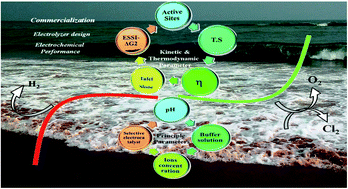Hydrogen energy is considered as an renewable and interminable source to combat the present energy crises and it is capable of balancing the environmental impact due to the extensive use of fossil fuels. Hydrogen production emerges as a contemporary technique to get rid of this energy crises and environmental issues. This review focuses on the clean/fresh-water electrolysis and its commercialization aspects. Seawater is a great source of water that can be used for electrolysis as a substitute of clean water. Several issues impede the widespread use of seawater electrolysis as the substitute of fresh water. In this review, an extensive discussion on theoretical and experimental investigations has been presented to explore the most effective pathway to achieve the highest performance of seawater electrolysis. The basic parameters such as pH of seawater, use of buffer solution over the electrolyte, applied potential, effect of dissolved ions, and nature of electrocatalyst are systematically studied to explore the most effective route for direct seawater electrolysis. The overview of this article offers a through understanding of the existing shortcomings and the possible way out related to seawater electrolysis for the benefit of mankind.
